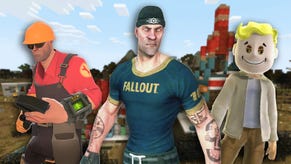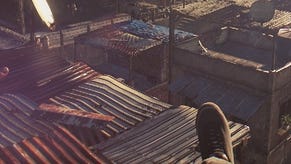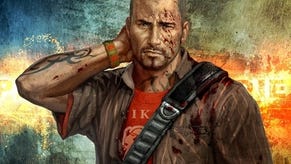Splash Damage's Paul Wedgwood
Brink's director on delays, ambition and the pressure of game development.
You still have people running down the middle of the road spraying and praying, so we have upgrades that allow them to extend the magazine and spray and pray for even longer - but it comes with a penalty of decreasing the equip speed and stability of the weapon. If you want to support that as well as people who understand spraying is not as effective as controlled burst-firing, then providing you have a balance between the two you can have both.
En route to the shooting there's always something you can do that helps your team - you can buff their shooting, or buff their health, or you can give out ammunition. You can do all those things for yourself, so we don't say you can't play selfishly - if you want to play ninja medic and give yourself health all the time and shoot people, you absolutely can do that, but you're not going to level as fast as someone who gives other people health. We also charge you double the amount of power to heal yourself compared to healing other people, so if you all help each other out instead it costs everybody less and the reward is higher.
I think it would be a mistake for a developer not to take very seriously the investment that a publisher makes, because it goes so far beyond the pure cost of development. By the time you add in things like marketing budgets, the cost of manufacturing, cost of goods, royalties to platform holders and all that stuff, the budgets now are just immense.
It's movie money. People have fortunes invested in video game development now, where before you could make a game for one or two million, self-publish, put it out on shareware discs and collect the lion's share of the royalties.
But developers aren't taking a significant risk with anything other than their time, and since game development is so enjoyable that in itself it's a rewarding pursuit. So I think there's always growing pressure, because if you choose to be in triple-A blockbuster video game development then you have to take all of the things that come with that method of making games.
The toughness comes I think from handling things like transition. For Enemy Territory: Quake Wars we had an art team, a design team and a programming team and that was that. Now we have an animation team, a character art team, an environment art team, a technical art team, a core technology team, a gameplay team, an online services team, a level design team, a gameplay team, writers... It's 12 or 13 and every one of those is between three and 20 people, and it becomes such a huge process.
We have a really good relationship with them. They know internally they have such a great team in Bethesda Game Studios, headed up by Todd Howard, who has just been making stonkingly good games for a really long time, and I think Bethesda Softworks take a very hands-off approach and allow people to be creative and iterate, and make your own decisions about what to cut and what stays in.
We're I think equally transparent. Our Bethesda producer has the door code to Splash Damage - he turns up whenever he likes, he has a desk on the executive floor, he has a desk on the main development floor, he can turn up at any meeting he feels like going to, and I think as long as you have that very open relationship with a publisher then it tends to just lead to good things.
I don't think any developer can ultimately have too great an impact on an exact sales figure. There are games that are licensed that come out at the same time as really big movies and fail to sell. There are games that have very low Metacritic scores that sell incredibly well despite how poor they are as an offering to a player. I think with Bethesda the only thing they want is for the game to be really good. Because our interests are all aligned in that area it's a straightforward relationship.
Oh yeah. I just heard from the president of Bethesda Softworks - he came up to me and said he heard QA was having great fun with the build for QuakeCon - so we have a ton of feedback going back and forth. Of course we have our own production testing team internally, but QA is handled at Bethesda, so you have the standard bug databases and that kind of stuff.
But we don't have that sense - and I don't think anyone does who works with Bethesda Softworks does - that anyone is policing your design intentions and telling you what you must or mustn't do, or that you must achieve this rating or this target audience. I've never had a conversation with Bethesda where they've said, "Right, we are focused on a male 18-34 year-old." It's just about making a game where not only does the player not want a refund but they're going to tell all their friends to go out and get it as well. That's a pretty easy goal to focus on.
Paul Wedgwood is one of the founders of Splash Damage and game director on Brink, which is due out in spring 2011.












